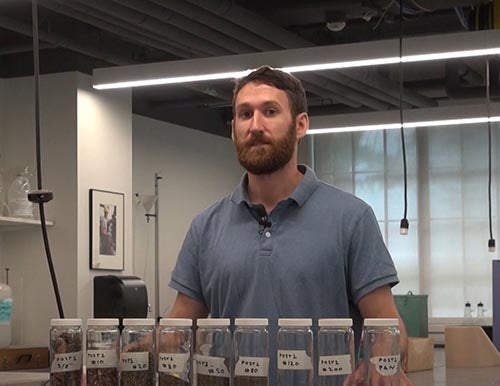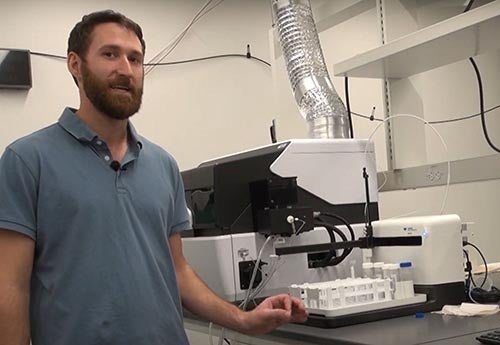Andrew Sheerin, civil and environmental engineering, M.S. ’23, Ph.D. ’25, of Newport, Rhode Island, came to the graduate program at the University of Rhode Island to deepen his understanding of sustainable systems and address his research gaps.

He had a background in systems engineering and computer science, having earned a B.S. from George Washington University in 2019. At George Washington, he developed a technical foundation in programming and statistical analysis. “I have always been motivated to use these skill sets to focus on developing sustainable and resilient urban systems that contribute to a cleaner environment,” said Sheerin.
He enrolled in the master’s program for civil and environmental engineering at URI in 2021. “During my time, I grew to appreciate the academic environment, which is full of collaboration and support between peers to achieve a greater good. These experiences led me to continue my research at URI as a Ph.D. student,” he said.
“I grew to appreciate the academic environment, which is full of collaboration and support between peers to achieve a greater good. These experiences led me to continue my research at URI as a Ph.D. student.”Andrew Sheerin, Ph.D. ’25
While studying for his doctorate, his research explored stormwater pollution in urban areas and determined the optimal methodology for street sweeping to serve as an effective nonstructural best management practice. “I determined the primary sources of urban pollution and predicted the transport of those pollutants through the buildup and stormwater wash off processes,” said Sheerin. He developed a data-driven tool to enhance street sweeping programs by prioritizing where to sweep based on geospatial factors and optimizing when to sweep based on weather patterns. The outcome of his research aims to reduce stormwater pollution while enabling street sweeping to be the most cost-effective pollution control measure.
Additional research included environmental modeling, ranging from surface water and groundwater to carbon cycles and wind forecasting. “I wanted to know any way I can use the power of data and programming to simulate real-world processes, while contributing to our planet’s sustainability,” said Sheerin.
Sheerin was a research assistant for four years and a teaching assistant for two semesters for the course Environmental Sustainability and Green Engineering. “In the class, we conduct environmental life-cycle assessments to quantify the environmental impact of systems throughout their life cycle. During this class, I taught the software components, where we would use Python and Brightway2 to conduct our analyses,” said Sheerin.
He often worked with undergraduates while conducting his research, enjoying the opportunity to mentor students. “I had the privilege to work with four undergrads during my research, and they helped throughout many stages of my research, including field work, analytical method development, and computer modeling,” he said.
Despite his computer background and lack of chemistry and laboratory experience, his favorite memories from the Water for the World lab revolve around learning how to use and operate the advanced analytical equipment. “We are fortunate to have access to analytical and imaging facilities in the engineering building,” said Sheerin. “The greatest memories come from developing new methods that haven’t been explored before in our facilities. These are core collaborative experiences during my time in the lab, as we all are eager to share knowledge and resources so everyone can learn and use the equipment together.”

In his time at URI, he has authored four papers that are in review to the Journal of Environmental Engineering. He was also named a 2024-25 RISEUP Patents2Products fellow, a program at URI that supports academics to translate their research to the commercial market. He also presented at the 2025New England Water Environment Association’s spring conference. And he presented posters at the 2022 and 2023 Transportation Infrastructure and Durability Center annual conferences, 2023 Rhode Island Department of Transportation resiliency peer-exchange, 2024 NEWEA annual conference, and the 2025 New England Interstate Water Pollution Control Commission annual nonpoint source conference.
During his downtime, he was sure to take advantage of being in his home state–especially a state that connects him so closely to the water. “As a Rhode Island local, I am connected to our beautiful and intricate rocky coastline. I am a passionate sailboat racer, and love exploring the coves and islands from the water perspective, but I also love to take my bicycle around the state to capture the land perspective, too,” said Sheerin.
He plans to continue postdoctoral research for the remainder of the year, continuing to explore how to best use computer programming and geospatial datasets to model environmental processes and contribute to efficient and resilient systems.

He will also pursue the commercialization of his startup, SWPT (Storm Water Pollution Tracker), which uses a software application that is the primary outcome of his doctoral research. SWPT is designed to predict urban pollution and optimize street sweeping to reduce stormwater runoff pollution and improve the operational efficiency of state and municipal street-sweeping programs.

